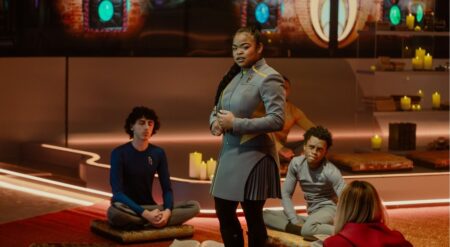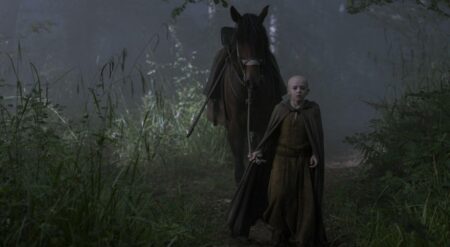
Bulgasal: Immortal Souls is a dark fantasy K-Drama, with historical drama elements, on Netflix starring Lee Jin-wook, Kwon Nara, Gong Seung-yeon, Lee Joon, Kim Wook Seok, Park Myung-shin, and Jeong Jin-yeong. What transcends across the span of 16 episodes is a multi-layered mystery surrounding characters Dan Hwal, Kim Bwa-yeon, and Ok Eul Tae as their lives intertwine between a constant cycle of life and death. Starting with a curse, each episode will have you peeling back more layers. However, with a middle that drags, some viewers may tap out before they’ve reached the heartfelt finale episode.
The principle of karma is that all of our actions influence our future outcome. Take into account the additional factor of reincarnation, and this accumulation of karma has a ripple effect across future incarnations of one person’s soul. Bulgasal: Immortal Souls takes the principle of karma and the philosophy of reincarnation to craft something that highlights the importance of breaking cycles. While there is this idea that certain life events are outside of our control, the ripple effect of a person’s karma across generations of time impacts all. If you’re feeling a bit lost, though, by this particular breakdown, don’t worry. There are all sorts of entertainment to be gained from Immortal Souls outside of the philosophical.
The first two episodes set the tone for the kind of mystery viewers will be attempting to solve. The viewer’s introduction to Dan Hwal as well as Kim Bwa-yeon is done well. The first episode outlines how Dan Hwal came to become a Bulgasal. Six hundred years prior to the events of the series, viewers get a walkthrough of Hwal’s human life. Considered cursed by the Bulgasal before birth, Hwal spends his life being ostracized until meeting the powerful general Dan Geuk (Jeong Jin-yeong). The general adopts him and his life becomes a bit easier, but not by much.
The curse of Bulgasal impacts everyone around Hwal in different ways. It curses his children with either disability or death. His wife Dan Sol (Gong Seung-yeon) blames him for the family’s suffering. Hwal can only react by working with his adopted father to eliminate all monsters. One day, though, he comes face to face with a mysterious woman. A woman who had once saved him from death in his youth. This woman, ultimately, serves to be his doom.
In what amounts to his final night of humanity, Hwal endures the pain of his family being slaughtered. All of those regrets distract him and the woman finds him to kill him for reasons undisclosed. However, something goes wrong. Hwal’s soul transfers to her, rendering her human. This process, though, converts him into the Bulgasal, and he kills her. But before she dies, she warns him that he has brought forth further bad karma and another cycle of retribution. For the remainder of episode 2, viewers learn more about Kim Bwa-yeon, the reincarnated female Bulgasal, and how Hwal has spent his time leading up to her discovery.
With these breadcrumbs, viewers are then taken on a journey to learn more about the world of Bulgasal: Immortal Souls, with all of its creatures and how the writers delicately handle the concepts of karma and reincarnation in a meaningful fashion. Viewers will also learn the reasoning behind the multiple mysteries we are to uncover.
Part of the fun in Bulgasal: Immortal Souls is in the world-building. We’re introduced throughout the season to a whole litany of monsters. Maybe it’s just me, but seeing these creatures conceptualized and then seeing how the monsters can be transferred into reincarnated human form was pretty neat. This particular note can also be applied to how we see the core group of characters and their reincarnations throughout the show. What the writers have done to maintain the thread is quite good. Something that could easily get tangled up was handled well.
Another success is in how the actors infuse a natural likability to the characters they portray onscreen. All of the characters we see are wrought with complications. How they are written could easily have been played in a variety of different ways, which would have also had an impact on audience perception. I will say, though, that oftentimes the supporting characters surrounding Dan Hwal and Kim Bwa-yeon were far more interesting and easier to connect to sometimes than our main character duo. That said, the direction and the decisions the cast members make as well as natural chemistry between the group just works. By series’ end, you can’t help but want happy endings for everyone, including Lee Joon’s Ok Eul Tae. And he’s kind of the worst.
Speaking of Ok Eul Tae, Lee Joon’s performance is a definite standout. From the time his character is introduced to the epic finale, he easily commands the attention of screen. He utilizes his physicality well here, and there’s always an undercurrent of danger that he invokes even when Ok Eul Tae is trying to be harmless. What makes his performance so compelling, though, are the levels and layers. A character of great pain, but also a character that will do anything to get what is his, Lee Joon has embodied a villain that could easily have been played one-note.
While the chemistry and powerful performances of the cast glue everything together and the mystery is the core of the show, Bulgasal: Immortal Souls does suffer from mid-season pacing issues. Clocking in at 16 episodes and with a storyline contingent on solving the mysteries surrounding our main characters, a balance must be achieved in order to keep things moving for the viewer. However, it seemed mid-season everything ground to a halt. Whether due to concerns about reaching the end of the mystery too quickly or whatnot, this reduced momentum had me questioning whether or not to keep going. And, if it had me questioning that, it poses the question of whether or not this might have been an issue with less determined viewers as well.
A final highlight, which I absolutely cannot leave out, is the cinematography. From the first episode onward, there are breathtaking moments captured that viewers will not be able to turn away from. The drone shots utilized in this series are masterful. In these moments, it adds an extra layer of cinema that elevates the series considerably.
Bulgasal: Immortal Souls will not be for everyone, but this dark fantasy features a compelling story and mystery that has a strong pull. Its cast pairs well with the writing, bringing a likability and nuance that will tug at the viewers’ hearts while, at the same time, also making them question everything. Where the series falters is in its mid-season pacing. If the episode order had been dropped to 12 episodes, maybe 14, I wonder if the pacing issue could have been resolved. As is, I do caution viewers to be patient as the finale is well worth the wait.
Bulgasal: Immortal Souls is now streaming exclusively on Netflix.
Bulgasal: Immortal Souls
-
Trading - 6.5/106.5/10
TL;DR
Bulgasal: Immortal Souls will not be for everyone, but this dark fantasy features a compelling story and mystery that has a strong pull. Its cast pairs well with the writing, bringing a likability and nuance that will tug at the viewers’ hearts while, at the same time, also making them question everything.






